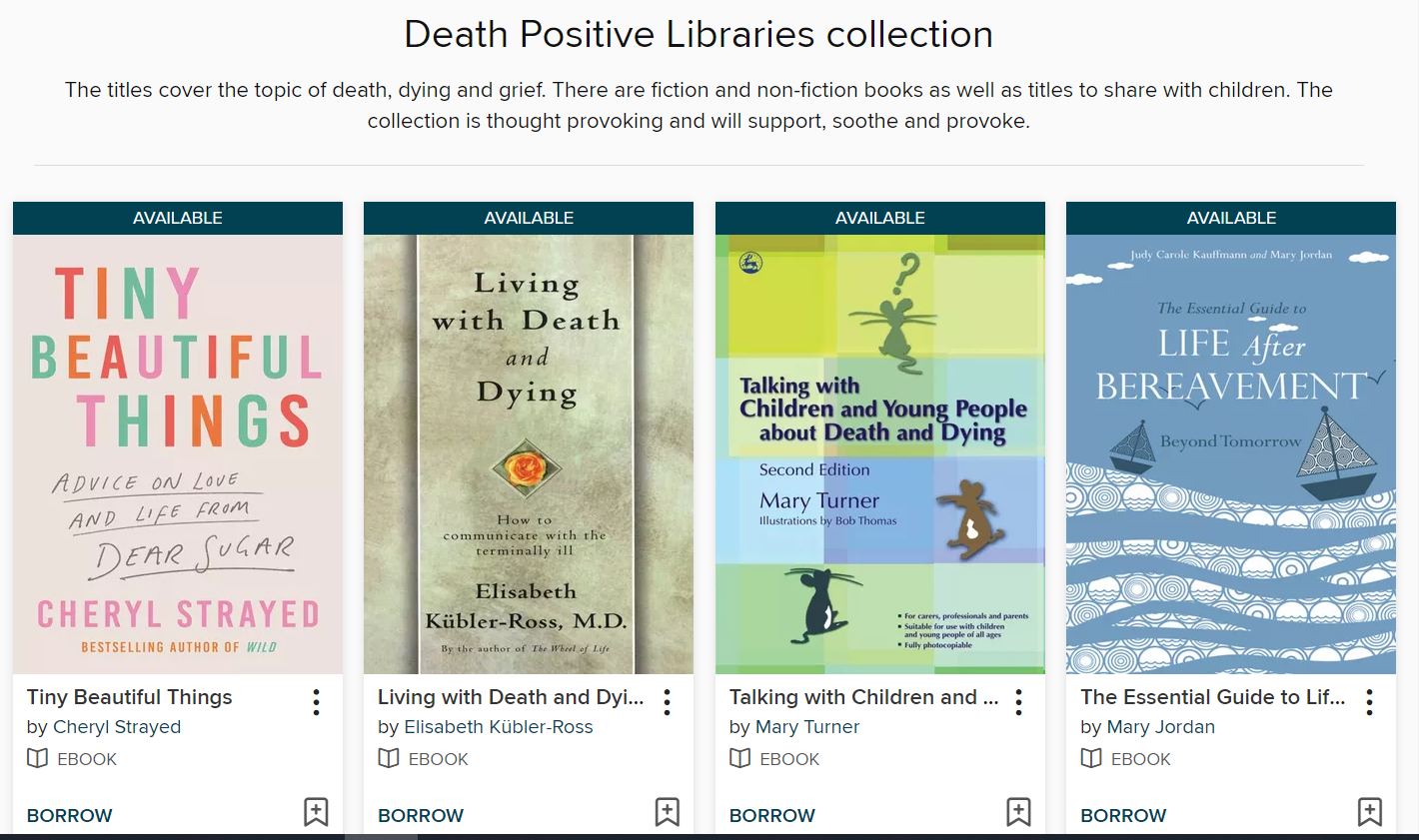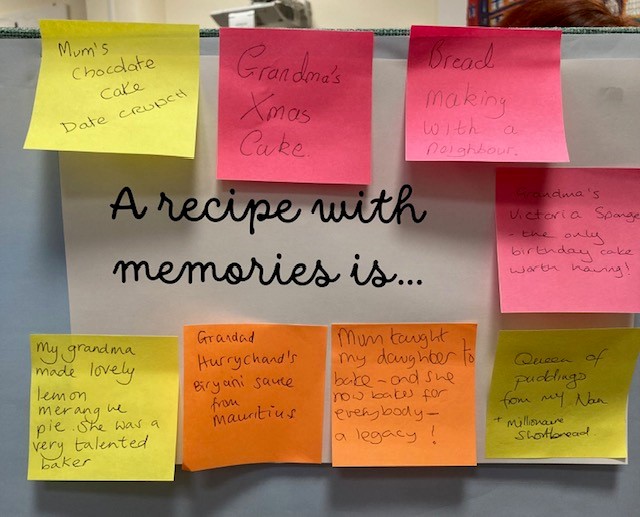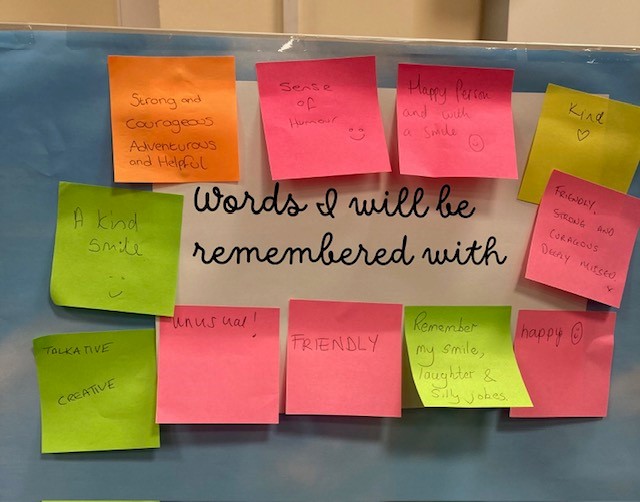Case studies and community assets
The following case studies highlight some of the excellent work happening in Kirklees around end-of-life care and support, and provide examples of good practice. Each case study has been presented in the words of that organisation.
Huddersfield Mission
Huddersfield Mission has been serving the people of Huddersfield and wider Kirklees for over 100 years. Our services are available to all, but we recognise that we are best known for our support to people who are experiencing homelessness, mental health, addiction, or significant poverty.
Who we support and what we offer
We see ourselves as being a service for all but with particular expertise working with people with multiple and complex needs.
We have recognised for some time that many of our customers have significant health issues. For people with multiple and complex needs, the health system can be particularly difficult to navigate. In some cases, other needs take priority so it is not uncommon for us to see people with significant health issues that are not being addressed. The mainstream health system is increasingly using a digital-first approach, which further exacerbates the issue as many of our customers struggle with digital access or simply cannot afford the equipment.
Working in partnership with The Kirkwood we have provided support to customers who have a life limiting illness. The approach is for the Kirkwood outreach staff to start by having meaningful conversations about health, dying, and living well in the safe space that is the Mission cafe. A private space can be provided here.
Supported individuals
Cafe and advice staff at the Mission often hear from customers about their health needs, which we are not able to directly respond to. There have been many cases where the health needs related to a terminal illness or a condition that if medical support was not received could potentially be life threatening. Often customers are very hesitant to obtain medical support, or they find it difficult to navigate the health system.
Working with staff at The Kirkwood, we have established a weekly outreach service. Mission staff can introduce the hospice outreach staff to a customer, who is then able to have meaningful conversations about health, dying, and living well.
One of our customers told us that the hospice staff helped her get an appointment which she had been trying to get herself for the last 16 months. She describes the outreach worker as a nurse and a friend.
Another customer, who initially refused to talk about their health, was supported to have conversations about their significant health issues and reduced life expectancy. Ultimately, this has supported the individual to live well for as long as possible and to discuss their wishes for dying well too.
Huddersfield Mission's work is guided by a number of principles that together form our Theory of Change. Two of the principles are of particular significance:
- The best intervention deals with the immediate need but also the underlying or long-term issues.
- Advice is best given within a relationship of trust.
This project is an excellent example of the value of these principles in practice.
The outcome
Customers are supported to have conversations about living and dying well. Relationships and trust have been built with The Kirkwood staff, who can signpost patients to obtain the support they require. Customers are receiving the care they are entitled to.
The Kirkwood
At The Kirkwood , we help those in our care to live well and to make the most of every single day. We make the complex simple by focussing on what's important. And we support families and loved ones to live on - and live well. We're here for local people across our community whenever and wherever they need us, helping to improve their quality of life - in the ways that matter most to them.
Our patients, their carers and those closest to them all have their own needs, aspirations and expectations; our support is built around their personal wishes and goals. We offer a wider range of services designed to support patients, carers and family members at every stage of illness.
Our services include (and are not limited to):
- 24/7 Advice Line - Advice and support for patients, family members and healthcare professionals, 24 hours a day 01484 557 910
- Support and Therapy - Offering a wide range of services to help people cope with a life limiting illness, offering practical and emotional support to improve quality of life
- Community Palliative Care - Advice and support for people living at home and in care homes
- In-Patient Care - 24/7 specialist care on our 16 bed in-patient unit
- Family and Spiritual Care - Emotional and psychological support for those living with, affected by or bereaved through a life-limiting illness
- Complementary Therapies - A wide range of non-medical treatments for people affected by life-limiting illness and their carer.
What happened
Through partnership working, we have built on existing work to create tailored resources for care homes and development of the Kirklees End of Life Care Charter. A programme of virtual education combining both e-learning and taught sessions has been delivered. Ten care homes that are champions, with staff who have completed training, adopted the Charter within their care home and are able to evidence its impact.
Who was supported
The care homes have also been supported by specialist staff to review their existing processes, procedures and experience of supporting residents with a life-limiting illness. Areas for quality improvement have been identified, and care home managers have engaged in a mentoring scheme to support initiatives that have facilitated the processes needed to evidence the meeting of, and the achieving of the standards of the Charter. The mentoring scheme was facilitated by The Kirkwood, Locala Care Home Support Team (CHST) and other community partners with significant time devoted.
The outcome
All 10 care homes have evidenced an impact, with a range of quality improvement schemes undertaken, meeting the aim for more people to experience great care at the end of their life.
The quality improvement focus has included the following areas:
- Unplanned hospital admissions audit
- Easier identification within the care home as to which residents are for resuscitation and which residents are not
- Advance Care Planning
- Systems in place to support staff after a resident's death
- Staff supervision
- Involving the care home in the local community
- Dignity in Care Champion
- Service user information
- Review of care home policies/ care plans
- Use of assessment tools
Overall benefits:
- Dedicated support from The Kirkwood, Locala CHST and other community partners facilitating the successful achievement of the charter for the care home (mentoring scheme and training and education provision)
- Raised profile for the care home in providing high quality end-of-life care
- The care home gains valuable evidence towards meeting the CQC standards
- The End-of-Life Charter becomes embedded into care homes
- Dedicated training and education provided
What is happening
Kirklees Community Champions are trusted and trained individuals with a desire and commitment to make a difference within their local community. The model of work adopted by Community Champions is flexible and based on trust. It empowers communities to deliver change in a way which is tailored to the needs of their communities and values local knowledge.
The Champions gather data and insights through the conversations they undertake, which Healthwatch then analyse to produce a report on at the end of the topic period. Topics tend to be 4-6 weeks duration and engagement is focused on people living in more deprived communities and those from inclusion health populations. There are over 88 champions, covering at least 18 community languages.
Community Champions are running a campaign in May-June 2024 to focus on how people with life limiting illnesses can be better supported.
Supported individuals
People with a life limiting illness, of all ages, in Kirklees, and their loved ones
Intended outcomes
The aims of the campaign are:
- Increasing the number of conversations held to sensitively explore the stigma associated with death and dying and better understanding of what the barriers may be for different groups
- Improved awareness of services available to support people with a life limiting illness
- Increased awareness of choices that people can make and options and support that can enable a better death
- Practical information shared on how people can be supported when a loved one is dying and when people are bereaved.
What happened
A place-based hubs approach has been undertaken, in line with our organisational aim of increasing service referrals, income generation and volunteer engagement through an integrated approach. Working with local residents, existing community groups, local businesses and health care services, our team have explored how to embed The Kirkwood into the fabric of our communities. The Kirkwood has a lot to offer local communities but also needs the support of local communities to be sustainable as a charity.
Two engagement events were held and over 35 organisations or groups connected with.
Who was supported
Targeted work has been undertaken in different communities in Kirklees, including those in Batley, to better understand what support is needed for people with a life limiting illness living in this community and how we can become more agile and accessible than ever before.
The outcome
As a result of this targeted engagement, the need for a bilingual role based within the community has been identified, and funding sourced from St James's Place.
Kirklees Library Service
Kirklees Libraries are part of the Death Positive Libraries initiative, working to create an open culture where people can be more comfortable talking about death and loss and can support others who are grieving.
Who we support and what we offer
The initiative aims to remove the barriers to talking about death and dying with books, information and activities to encourage conversation. Our libraries are safe, trusted spaces, with compassionate staff and volunteers who bring people together and signpost to partner organisations and specialist support.
We have curated a collection of books to help adults, children and families understand and manage feelings of grief. Our books can guide, inform or entertain, but all help readers understand more about death and loss.

We work with partners to explore creative ways to help people talk about death and grief by using books, stories and the arts. We work with writers, artists, community organisations and end-of-life specialists to develop creative ways of bringing people together, so they feel supported, listened to and able to talk about death, dying and grief.
Libraries offer sensitive support and effective signposting in the heart of the community. They offer free books and information and are an effective first step towards more specialist support.
What happened and the intervention
We have a focus on Dying Matters Week every year, working closely with The Kirkwood. In the past we have encouraged people to share memories of loved ones who have died, asked people to write poetry, and made a soundscape recording of memories and favourite book/poetry extracts.


Our events celebrating The Day of the Dead are aimed at families and focus on celebrating memories and acknowledging loss.
Library events are free and open to all and offer a 'light touch' way of starting sensitive conversations or sharing personal stories.
They are an effective way of reaching groups which are not connected to support organisations, or not aware of the support which is offered.
This year we featured in the national Dying Matters (public library) Toolkit as an example of good practice - showing simple but effective ways to engage with the community.
Supported individuals
Adults, families, those who are unaware of existing support, people who want to manage their feelings of grief using books, people who find solace in reading stories which resonate with their lived experience, parents/carers who use a story as a way to help children understand the death of a family member
The outcome
Our events are valued by all who attend - feedback shows the value of a non-clinical venue being used to give support and signpost to additional support. Also valued is space provided to just sit, listen and browse with no pressure to talk or give personal details, but also opportunities to share if people want to.
Resources
Change Grow Live (CGL)
Change Grow Live (CGL) is a charity which supports people with challenges such as drugs and alcohol, housing, justice and health and wellbeing. Clients are enabled to access support from specialist providers such as Kirkwood if a service user is identified with deteriorating health concerns, for example COPD, which is a condition associated with substance misuse.
Service users may not feel comfortable talking to other agencies if they are using substances or been prescribed opiate substitute medication because of the stigma attached. CGL take a holistic approach addressing both physical and emotional support of the service user.
Levels of prescribing may need to be higher because of tolerance from historic drug use so it might not be appropriate to prescribe to levels advised by clinical guideline. This is where the CGL specialist clinical team would advise, work in partnership and see service users at home with the specialist nurse from Kirkwood. CGL believe that better integration and collaboration between different agencies is important to assure good palliative care for service users. This could involve specialist pain management tailored to the individual needs of the service user to enhance quality of life during this sensitive time.
The following is an example of how CGL supported one service user through his terminal illness; his name has been changed to protect his identity.
What was the issue
John had terminal cancer and entered treatment during the Covid pandemic when he began to use heroin to manage his pain. He lived with his partner who was in her early 80s. They both had children from previous relationships but had no contact with them and their only support had been each other.
How were they supported
John was seen at his home address on a weekly basis by his allocated Recovery Coordinator and Non-Medical Prescriber.
John explained to his Recovery Coordinator that he was frightened of dying in pain as he wanted to stay at home and did not want to go into a hospice, a position supported by his partner. The Recovery Coordinator and Non-Medical Prescriber supported John to plan what his end-of-life care would look like and regularly reviewed his medication.
The Recovery Coordinator contacted the Marie Curie Nurses, and the Nurses commenced their support the next day by providing John with 4 x daily visits and a Nurse who stayed overnight.
Change Grow Live contacted the District Nursing Team who arranged for a new mattress to help John sleep in his own bed as he had been sleeping in his chair in the sitting room.
The Non-Medical Prescriber helped John with personal care such as shaving and going to the bathroom whilst the Recovery Coordinator spent time with his partner to check on how she was coping.
The outcome
John stated that he was no longer frightened of dying. His main goal was to be off his methadone before he died, and this was successfully achieved.
